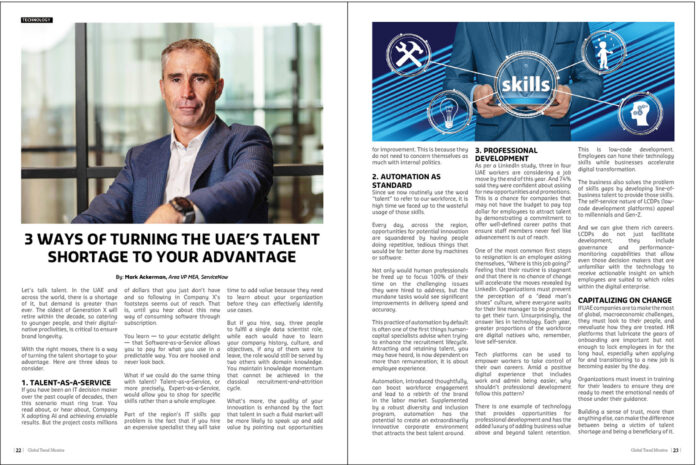By Mark Ackerman, Area VP MEA, ServiceNow
Let’s talk talent. In the UAE and across the world, there is a shortage of it, but demand is greater than ever. The oldest of Generation X will retire within the decade, so catering to younger people, and their digital-native proclivities, is critical to ensure brand longevity. With the right moves, there is a way of turning the talent shortage to your advantage. Here are three ideas to consider.
1. Talent-as-a-Service
If you have been an IT decision maker over the past couple of decades, then this scenario must ring true. You read about, or hear about, Company X adopting AI and achieving enviable results. But the project costs millions of dollars that you just don’t have and so following in Company X’s footsteps seems out of reach. That is, until you hear about this new way of consuming software through subscription. You learn — to your ecstatic delight — that Software-as-a-Service allows you to pay for what you use in a predictable way. You are hooked and never look back.
What if we could do the same thing with talent? Talent-as-a-Service, or more precisely, Expert-as-a-Service, would allow you to shop for specific skills rather than a whole employee. Part of the region’s IT skills gap problem is the fact that if you hire an expensive specialist they will take time to add value because they need to learn about your organization before they can effectively identify use cases.
But if you hire, say, three people to fulfil a single data scientist role, while each would have to learn your company history, culture, and objectives, if any of them were to leave, the role would still be served by two others with domain knowledge. You maintain knowledge momentum that cannot be achieved in the classical recruitment-and-attrition cycle. What’s more, the quality of your innovation is enhanced by the fact that talent in such a fluid market will be more likely to speak up and add value by pointing out opportunities for improvement. This is because they do not need to concern themselves as much with internal politics.
2. Automation as standard
Since we now routinely use the word “talent” to refer to our workforce, it is high time we faced up to the wasteful usage of those skills. Every day, across the region, opportunities for potential innovation are squandered by having people doing repetitive, tedious things that would be far better done by machines or software. Not only would human professionals be freed up to focus 100% of their time on the challenging issues they were hired to address, but the mundane tasks would see significant improvements in delivery speed and accuracy.
This practice of automation by default is often one of the first things human-capital specialists advise when trying to enhance the recruitment lifecycle. Attracting and retaining talent, you may have heard, is now dependent on more than remuneration; it is about employee experience. Automation, introduced thoughtfully, can boost workforce engagement and lead to a rebirth of the brand in the labor market. Supplemented by a robust diversity and inclusion program, automation has the potential to create an extraordinarily innovative corporate environment that attracts the best talent around.
3. Professional development
As per a LinkedIn study, three in four UAE workers are considering a job move by the end of this year. And 74% said they were confident about asking for new opportunities and promotions. This is a chance for companies that may not have the budget to pay top dollar for employees to attract talent by demonstrating a commitment to offer well-defined career paths that ensure staff members never feel like advancement is out of reach. One of the most common first steps to resignation is an employee asking themselves, “Where is this job going?” Feeling that their routine is stagnant and that there is no chance of change will accelerate the moves revealed by LinkedIn.
Organizations must prevent the perception of a “dead man’s shoes” culture, where everyone waits for their line manager to be promoted to get their turn. Unsurprisingly, the answer lies in technology. Each year, greater proportions of the workforce are digital natives who, remember, love self-service. Tech platforms can be used to empower workers to take control of their own careers. Amid a positive digital experience that includes work and admin being easier, why shouldn’t professional development follow this pattern?
There is one example of technology that provides opportunities for professional development and has the added luxury of adding business value above and beyond talent retention. This is low-code development. Employees can hone their technology skills while businesses accelerate digital transformation. The business also solves the problem of skills gaps by developing line-of-business talent to provide those skills. The self-service nature of LCDPs (low-code development platforms) appeal to millennials and Gen-Z. And we can give them rich careers. LCDPs do not just facilitate development; they include governance and performance-monitoring capabilities that allow even those decision makers that are unfamiliar with the technology to receive actionable insight on which employees are suited to which roles within the digital enterprise.
Capitalizing on change
If UAE companies are to make the most of global, macroeconomic challenges, they must look to their people, and reevaluate how they are treated. HR platforms that lubricate the gears of onboarding are important but not enough to lock employees in for the long haul, especially when applying for and transitioning to a new job is becoming easier by the day. Organizations must invest in training for their leaders to ensure they are ready to meet the emotional needs of those under their guidance. Building a sense of trust, more than anything else, can make the difference between being a victim of talent shortage and being a beneficiary of it.
